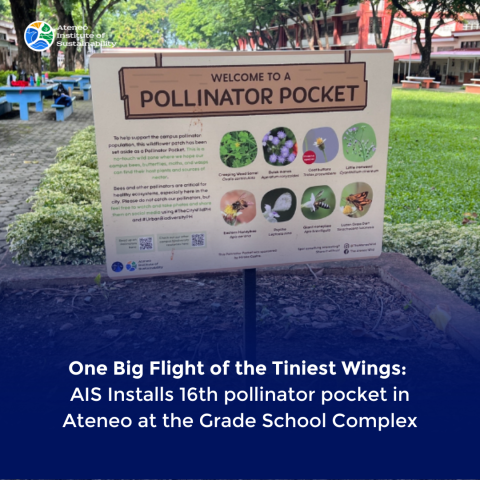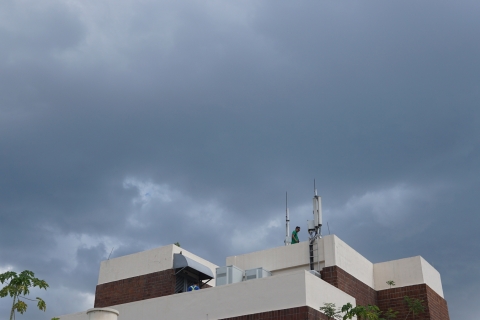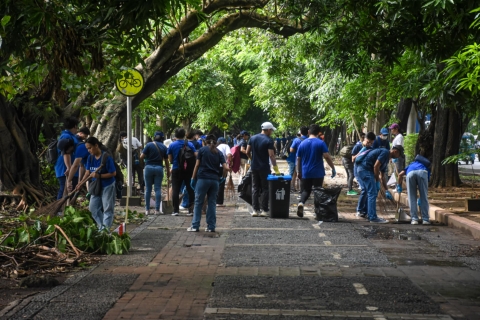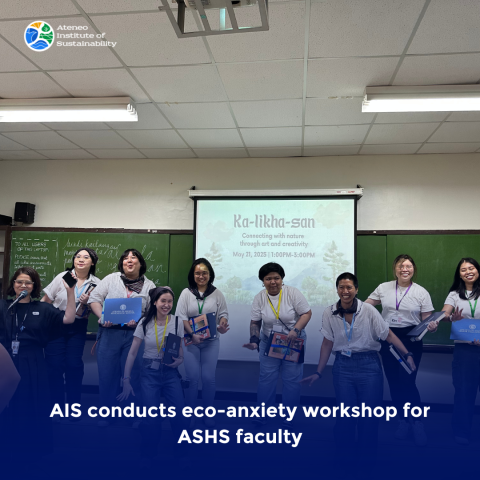Understanding investments on renewable energy technology in MCR-Ateneo webinar
24 Jun 2024 | April Urbano and Ivy Geraldine Ferrer
On 24 April 2024, the My Climate Risk – Ateneo de Manila University (MCR-Ateneo) Regional Hub, hosted by the Ateneo Institute of Sustainability, organized a webinar titled “Households’ Preferences and Willingness to Pay for Renewable Energy Technologies: Contingent Valuation and Choice Experiment Surveys.” My Climate Risk is a lighthouse activity of the World Climate Research Programme, which aims to develop and mainstream a bottom-up approach to regional climate risk, and has a mycorrhizal network of hubs that span all continents except Antarctica.
The webinar featured Dr Rosalina Palanca-Tan, PhD, Professor at the Department of Economics of Ateneo de Manila University, as resource speaker. Through the session, Dr Palanca-Tan shared the findings of two studies she conducted, which investigated Metro Manila households’ preferences and willingness to pay for renewable energy technologies as a climate mitigation strategy.
Dr Regina R Rodriguez, Professor of Physical Oceanography of the Federal University of Santa Catarina, Brazil and Co-Chair of the Scientific Steering Group of My Climate Risk, delivered the Opening Remarks on behalf of herself and her co-chair Dr Theodore G Shepherd. Dr Leland Joseph R Dela Cruz, Assistant Vice President for Social and Environmental Engagement for Development and Sustainability (formerly Social Development, Environment, and Community Engagement) at Ateneo de Manila University, delivered the Closing Remarks. The session was moderated by Mr Daniel C Ratilla, Program Officer for Climate and Disaster Resilience at the Ateneo Institute of Sustainability.
Dr Regina R Rodriguez, in her Opening Remarks, briefly discussed the vision, goal, and purpose of My Climate Risk, which include developing and mainstreaming a ‘bottom-up’ approach to regional climate risk. She also highlighted a study by E F Schumacher, emphasizing that climate change science, like Schumacher’s findings on economics, should be structured “as if people mattered.” She added that both disciplines share many parallels, such as the need to address the complexity of local situations and the importance of simplicity when dealing with deep uncertainty.
After the opening remarks, Dr Palanca-Tan proceeded to share the findings of two studies that she had previously conducted, which investigated Metro Manila households’ willingness to pay (WTP) for renewable energy (RE) as a climate change mitigation strategy, considering the Philippines’ vulnerability to climate change and its commitment to reduce greenhouse gas emissions by 75% by 2030.
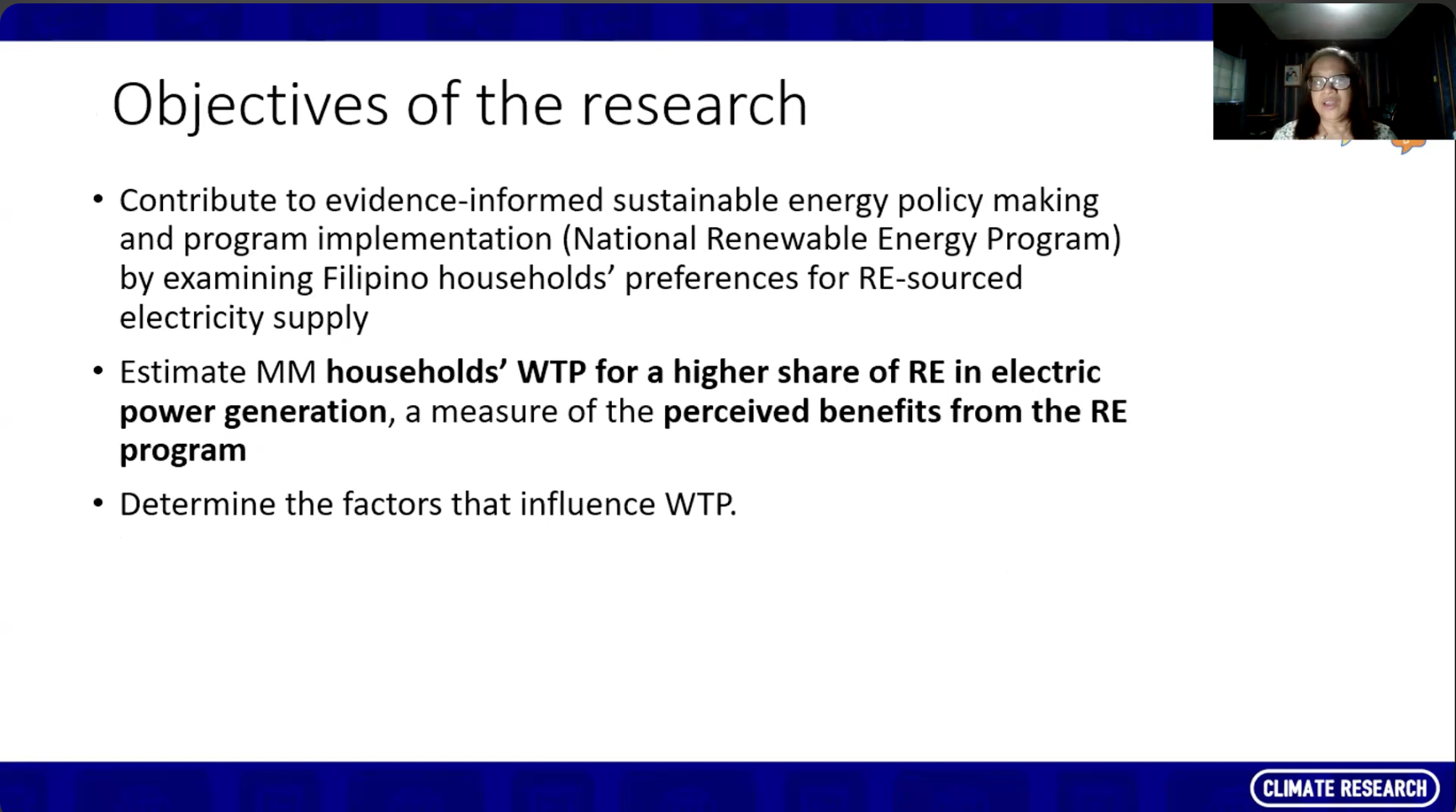
Drawing upon legislative frameworks such as the Renewable Energy Act of 2008 and subsequent policies such as the National Renewable Energy Program (NREP) 2011-2030, Dr Palanca-Tan contextualized the legal and regulatory environment facilitating private sector participation in RE investment. With this, she underscored as well one inherent challenge: while RE programs promise long-term environmental benefits, it entails immediate additional costs for consumers, promoting the inquiry to households’ willingness to bear such financial burdens.
One of Dr Palanca-Tan’s studies used the contingent valuation method to assess their readiness to accept varying levels of increase in their monthly electricity bills to fund RE initiatives. Her findings reflect not only the economic dimensions of environmental stewardship but also provide a window into the societal values and perceptions underpinning these decisions. Interestingly, the results revealed a nuanced landscape of preferences among Metro Manila households. The study also included a choice experiment offering alternatives and associated costs, which revealed solar energy as the most preferred option.
An Open Forum followed Dr Palanca-Tan’s presentation, during which she addressed the latest developments in renewable energy, evaluated participants' requirements, and the potential extension of the study beyond Metro Manila. It also touched upon how, despite acknowledging that solar energy costs are declining globally, the same trend is not yet fully experienced in Southeast Asia, including the Philippines. Moreover, she highlighted ongoing and future research, including a study on people’s preferences for rooftop solar systems and electric vehicles (EVs), and an expansion of the survey to Davao City in particular.
The webinar was attended by participants from the Philippines, with international attendees from India, the United Kingdom, Botswana, Germany, Malaysia, Morocco, Nigeria, Rwanda, Sweden, and Switzerland. This webinar is the first session in the 2024 iteration of “Climate Research ‘As If People Mattered’,” the name of which comes from the article “Small is beautiful: climate change science as if people mattered,” written by Dr Regina R Rodrigues and Dr Theodore Shepherd. The series occurred from April to May 2022. Replays and highlights of the event are available in the following page.





